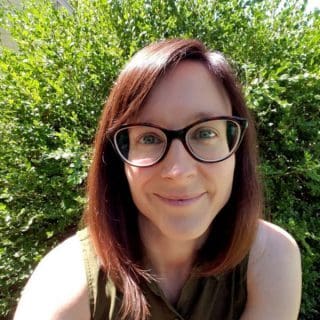
April 23, 2023
Meet the Educopians: Melanie Schlosser
By Kelly PendergrastMelanie Schlosser is Educopia’s Senior Community Facilitator, working with the Library Publishing Coalition and other communities and projects related to scholarly communications.
Below, Melanie reflects on Educopia’s new shared leadership model, her diverse role, and changes in the field of scholarly communications.
Can you reflect on the process of moving to a shared leadership model?
Our transition to a shared executive director model made me very aware of the extent to which decision-making at Educopia has always followed a standard, top-down approach. Even in an unusually flat, collaborative organization, we default to hierarchy in decision-making, because that’s how we’re all socialized. It’s been really interesting and empowering to think about and try out other models of decision-making that are less hierarchical in nature. It’s very much a work in progress, but I’ve become a firm believer in the power of distributed decision-making and the need to embed shared leadership throughout the organization.
How does your previous work inform your current role at Educopia?
My role at Educopia has allowed me to draw together a lot of disparate threads from my career, including librarianship, facilitation, event planning, organizational development, managing people, etc. It’s definitely a ‘kitchen sink’ kind of job, where I find myself needing all kinds of different skills throughout the day/week/year. However, the single most useful thing I did to prepare for this job was to work in an academic library for almost a decade. I’ve definitely found my home at Educopia and working at the field level, but I wouldn’t be nearly as effective at it if I weren’t intimately familiar with how things work in academia and librarianship on the ground level.
What is the most important lesson you have taken away from Educopia’s organizational culture and development work?
You can have all of the models and tools and good intentions in the world, but without solid relationships between people, you’re not going to get anywhere. I tend to be the squeaky wheel on the team advocating for more relationship development, even if it doesn’t immediately advance our goals, and it’s been wonderful to watch that pay off. After pushing through a lot of organizational development conversations very quickly, we took a step back and focused on “moving at the speed of trust” (an Emergent Strategy Principle) and really giving people time to internalize the concepts we’re working with. Even small things like adding an icebreaker to the beginning of every team meeting have made a big difference in team cohesion.
What changes do you see happening in the field of scholarly communications?
The sheer amount of burnout is staggering. The Library Publishing Coalition community is deeply engaged and deeply passionate, but also dealing with budget and staffing cuts at their home institutions. Many of them are covering multiple roles at work, while still working through the trauma and disorientation of the pandemic. I’ve had countless conversations with LPC working groups and individual volunteers over the last three years where I basically just reassure them that it’s OK to do less, it’s OK to push back timelines or downsize goals for the year. My attitude throughout has been that we can fix anything except burnout, and that looking out for the health of the community is my number one job.
Burnout and overextension aren’t unique to library publishing, of course, but we can’t realistically plan for the future without taking them into account. I think that all of our professional associations in librarianship, academia, and cultural heritage need to be focused on labor issues going forward. I don’t know what that will look like, but I don’t think we can consider ourselves to be responsibly representing our community members if we don’t tackle this head-on.